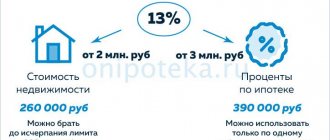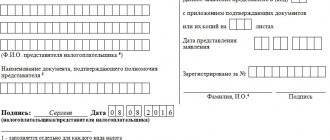Published 10/10/20
In accordance with clause 5 of Article 220 of the Tax Code of the Russian Federation, a property tax deduction for the purchase of an apartment/house/land does not apply in cases where the transaction is made between individuals who are interdependent . Interdependent persons also include a certain circle of relatives of an individual.
The list of relatives who are considered interdependent, and from whom a tax deduction cannot be used when purchasing housing, was changed from January 1, 2012 after changes to Article 220 of the Tax Code of the Russian Federation. As a result, the list of interdependent relatives was narrowed, which became a favorable factor for taxpayers. It is important to note that the changes only apply to transactions concluded since January 1, 2012 . Real estate purchase transactions completed before 2012 are governed by the old rules.
Let's consider the features of obtaining a property deduction for transactions concluded before and after 2012.
Under what conditions is it possible to receive a deduction?
So, is there a tax deduction when buying an apartment from a relative? This topic is clearly regulated by a specific legal act, namely the two hundred and twentieth article of the tax code. In accordance with the provisions of this article, only parties to a transaction who are not related to each other can receive a tax deduction. In already outdated legislation, any citizens whose family ties were proven were recognized as relatives. Therefore, until 2012, this was a wide range of people who were not entitled to receive a tax deduction.
Currently, relatives are considered to be people who fall into the following three categories:
- Spouses who are in an official state marriage with a stamp in their passport (civil marriage is not regulated in law).
- Parents and children, both natural and adopted.
- Siblings or half-siblings.
- Accordingly, cousins, nephews and other categories of citizens not included in the list are not relatives under the tax code and can claim a tax deduction.
But does the absence of a tax deduction apply to the purchase not of an entire apartment (house and other premises), but to a certain share of non-residential premises? In accordance with the same tax code, article two hundred and twentieth applies to all types of property, so even when purchasing a share of an apartment from relatives, no deduction is allowed.
Deduction when buying a home from relatives after 2012
As mentioned above, when changes were made to the Tax Code, since 2012 the persons recognized as interdependent were significantly narrowed. Currently, these include the second spouse, the deduction claimant’s parents, his children, and brothers and sisters. Neither grandparents nor aunts and uncles are considered interdependent persons anymore.
The Strogins couple bought an apartment from their wife’s mother in 2020. Since during this period a new version of the Tax Code of the Russian Federation was already in effect, the spouse will be able to receive a deduction for an apartment. To do this, the Strogins need to write an application for the distribution of the deduction entirely in favor of the spouse.
This is important to know: When can you get and how to return a tax deduction when buying an apartment in 2020
Changes in the Tax Code of the Russian Federation after 2012
Before moving on to a detailed consideration of the types of taxation in different editions of the code, you need to decide what a tax deduction is.
When a buyer purchases residential real estate (or takes out a mortgage), he has the right to claim a refund of personal income tax (personal income tax). In order to receive it, in addition to complying with the requirements listed in article two hundred and twentieth of the Tax Code of the Russian Federation, a person must have a source of income (in simple words, must receive a salary).
However, the buyer will not be able to claim a deduction if the property is purchased:
- at the expense of the enterprise where the person who received the property works;
- with funds provided by the state, maternity capital;
- with funds received from the state in another way.
The main concept that distinguishes the legislation before and after 2012 is “direct relationship”. Or rather, until 2012 it did not exist in the tax code at all, and, as said earlier, any relatives, even the most distant ones, were deprived of a tax deduction.
Now the legislation has softened significantly; now it contains the term “direct relationship”, with a strict definition of the circle of persons included in it. Such measures by legislators were quite predictable, since the rigidity and exclusion of any family ties resulted in a widespread violation of this law through the emergence of various ways of concealing family ties.
Naturally, any violation of the law is subject to punishment, and in judicial practice there have been quite often administrative cases related to this problem.
But even now there are a number of ways to circumvent tax regulations and hide family ties:
Drawing up a gift agreement. Of course, according to the law, there is no deduction for a gift, but the tax and bureaucratic component (paperwork, etc.) are significantly lower than when concluding a purchase and sale agreement. Therefore, quite often people give an apartment as a gift to a relative, and receive payment for it in person, without taxes and everything else.
Drawing up an agreement for the assignment of the right of claim. The drawing up of this agreement is regulated by federal law and does not provide for any differences in the procedure with both relatives and strangers. Therefore, the tax service is obliged to pay the deduction to the citizen in any case. In addition, this is not subject to any administrative liability, since in essence it is not an offense. The only thing is that the process of drawing up an assignment agreement takes a lot of time and requires filling out a large number of documents.
As a result, it turns out that it is not very difficult to bypass tax nuances due to the existence of other forms of transactions. But the question arises: why can’t you simply indicate when drawing up a purchase and sale agreement that the parties to the transaction are not relatives? How can the tax office check this?
Submitting reports to the tax office
In order to exercise the right to a deduction, it is necessary to timely submit to the tax documentation necessary for the calculation of mandatory payments, as well as an application requesting a deduction.
The following package of documents is submitted at the place of registration:
- Passport.
- The purchase and sale agreement, which states the cost of the apartment. Although the tax is calculated on the basis of the cadastral value, tax officials are required to check the market price of the property. Deviation by more than 20% is grounds for prosecution.
- Extract from the State Register of Real Estate. This document contains data on all characteristics of housing. To receive it, you must first register ownership of the apartment.
- A tax return prepared in accordance with Form 3-NDFL, provided for calculating tax. It is drawn up by the buyer independently; it must contain information about the cost of the apartment and the amount due for deduction.
- Certificate from place of employment 2-NDFL.
- Copies of payment documents confirming the fact of payment by the buyer.
- A statement indicating the grounds for granting a property deduction. To do this, a certificate is taken from the employer stating that in the last three years the applicant has constantly made contributions to the tax office.
This is important to know: What the buyer pays when buying an apartment
The declaration is the main document on the basis of which tax is calculated. It is submitted at the end of the year, so other amounts must be contributed as income, in addition to real estate. Since the calculation in the declaration is carried out on the basis of an agreement, the tax authority can verify the specified data.
Documentation must be submitted to the tax authority by the end of April of the following reporting year. The required amount must be paid by July 15. If the documentation is not submitted on time, the tax may be forcibly collected based on a court decision. In addition, a penalty may be added to the amount due.
What to do if income has been declared, but an application for compensation has not been submitted? When can I request a deduction?
The application to the fiscal authorities must be sent at the beginning of the next calendar year following the one in which the sale was made. That is, not before the end of the reporting period.
What to do if the application deadline has been missed? If no more than three years have passed since the sale of the apartment, the right to a deduction can still be obtained. Thus, citizens who sold their apartment no earlier than 2020 and did not exercise their legal right still have time until the beginning of 2020 to prepare the necessary package of documents for submission to the fiscal authority.
Can the tax office calculate kinship?
Guided by ordinary logic, one can guess that in some cases it is not possible to reliably determine whether people are relatives or not.
There are sources used by tax officials:
- passport information. Are the surnames and place of registration of the parties to the agreement the same (therefore, at a minimum, the husband and wife will not be able to hide their relationship);
- special databases about taxpayers. This is only possible if the relatives previously indicated in any contracts that they are related (due to some probability of a technical error or failure, this method may not work);
- written confirmation of the parties to the transaction that there are no family ties. The fact is that if false information is disclosed, if there is written confirmation, this will already constitute a deliberate deception, and it will no longer be possible to refer to an error or ignorance. Accordingly, the punishment for intentional deception is much more severe than for unintentional deception.
So, if, for example, a purchase and sale agreement is drawn up by stepbrothers with different surnames who have not previously been in an economic relationship, it will be almost impossible to prove their relationship, and they will be able to obtain a tax deduction.
Is it possible to buy an apartment from my grandmother using maternity capital?
For example, a couple with two children live with their grandmother in the same apartment, which they own in equal shares, and plan to buy out their grandmother’s share. If after the conclusion of the transaction the parties plan to continue living together, this indicates that:
- In addition to the main amount of payment for the share, the contract must also stipulate the amount of additional payment , which will be covered by maternity capital and will be transferred by the PF to the seller.
- Bank details of both parties to the transaction: the buyer’s account, where the assistance will go, and the seller’s account, where the transfer will go.
- The contract must include all citizens who have rights to shared ownership; they are marked in the line: sellers. In the event that shareholders have signed an agreement to transfer funds to one person, then this must be recorded in the agreement for the sale and purchase of a share using maternity capital funds.
- It is also necessary to indicate all adult children and the spouse, and if the spouse transfers the right of disposal to another, then this will must be notarized.
- It is necessary to correctly characterize the subject of the transaction: indicate the postal address, the number of shares and the share to be sold, the number of storeys of the building and the cadastral data of the apartment.
- Grounds for obtaining property: privatization or acquisition into common shared ownership.
- Write down the amount allocated by the Pension Fund for transfer to the seller and the final cost of the share.
- Negotiate the terms of installment payment of the due share.
- Receive a receipt for receipt of part of the funds, if this happens. It must contain a signature and the date of transfer of funds.
We recommend reading: What fee without an electric meter when the tariff increases in 2020
Consequences of revealing the deception
But what happens if somehow the tax service reveals the relationship between the parties to the transaction? There are two possible options for further developments:
There is no administrative, much less criminal, liability if it can be proven that the deception was unintentional. In this case, the parties to the transaction will simply have to return the tax deduction amount in full.
If the parties to the transaction confirmed in writing the lack of relationship, although in fact they were relatives:
- this is already classified as a deliberate deception of the tax inspectorate;
- Administrative liability comes into force and the participants in the transaction will, among other things, be fined.
But this rarely happens, and more often everything is limited to the fact that the person who hid the relationship will have to return the tax deduction within a certain time.
Therefore, apart from moral dissatisfaction, no damage will be caused to unscrupulous relatives who hid their relationship.
Olga Samsonova, assistant legal adviser at the Legal Services Center, answers:
In your situation, the tax authority is right, since a tax deduction is not provided for the costs of purchasing a residential building if the transaction was made between related parties.
In accordance with paragraphs. 11 clause 2 art. 105.1 of the Tax Code of the Russian Federation, interdependent persons are an individual, his spouse, parents (including adoptive parents), children (including adopted children), full and half brothers and sisters, guardian (trustee) and ward. In order not to be unfounded, it is worth citing excerpts from the Tax Code of the Russian Federation (clause 5 of article 220): “Property tax deductions provided for in subclauses 3 and 4 of clause 1 of this article are not provided in relation to the taxpayer’s expenses for new construction or acquisition of territory of the Russian Federation of a residential building, apartment, room or share(s) in them, covered by the funds of employers or other persons, funds of maternal (family) capital, directed to ensure the implementation of additional measures of state support for families with children, through payments, provided from the budget funds of the budgetary system of the Russian Federation, as well as in cases where the purchase and sale transaction of a residential building, apartment, room or share(s) in them is carried out between individuals who are interdependent in accordance with Article 105.1 of this Code.”










